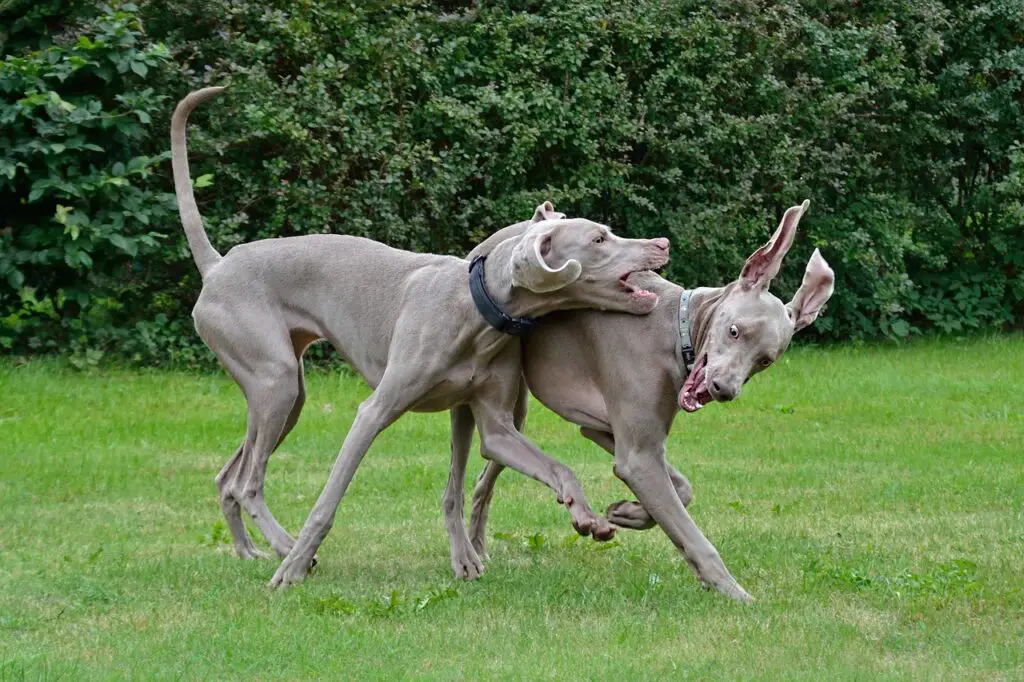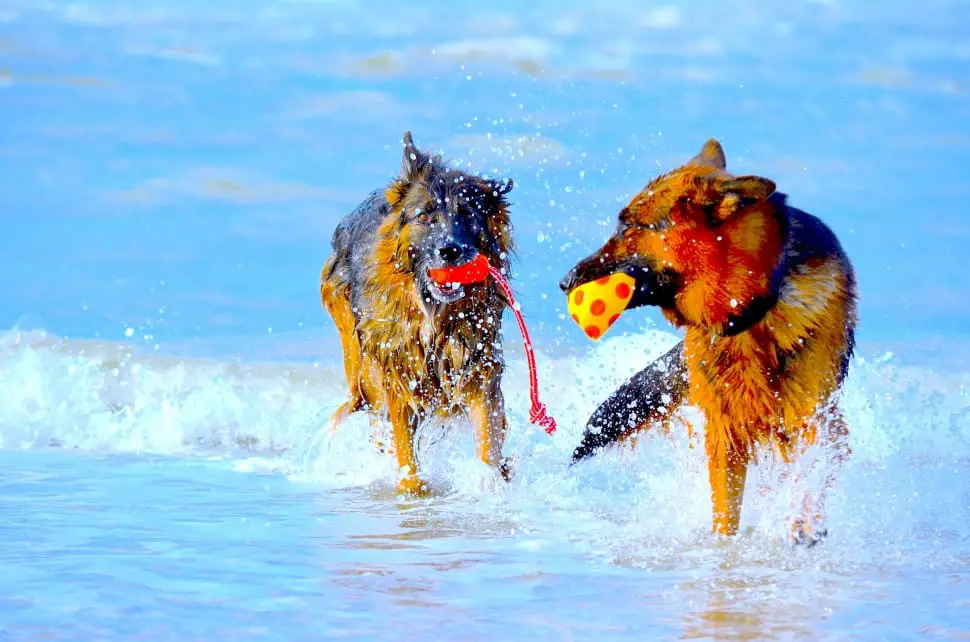Breeding dogs is a common practice that many pet owners and breeders alike participate in.
However, there are certain breeding practices that can be risky for the health of the animals. One such practice is breeding mother and son dogs.
In this article, we will explore the question of whether this breeding practice is safe and ethical.
We will examine the potential dangers for both the mother and the offspring, the reasons why some breeders might consider this practice, and alternative breeding methods that can be used instead.
Ultimately, our goal is to provide a comprehensive look at this controversial topic to help pet owners and breeders alike make informed and responsible decisions when it comes to breeding their dogs.
Can You Breed Mother and Son Dogs?

No, you can’t breed mother and son dogs! In many countries, such breeding practices are prohibited, and in many cases, considered animal abuse.
Nevertheless, breeders who practice mother-son breeding may try to justify it, believing that it helps preserve desirable traits or achieve genetic purity.
However, here are some direct facts that indicate the clear risks and harmful effects of breeding mother and son dogs:
- Increased risk of genetic diseases: Mother-son breeding leads to an increased risk of genetic defects and mutations due to the close genetic relationship between the parent and offspring. Such defects may lead to severe health consequences and compromised quality of life in the puppies.
- Risks to the female dog during pregnancy and birth: The gestation and birth of puppies from mother-son breeding may put excessive strain on the female dog, resulting in difficult births, puppy deaths, and even maternal deaths.
- Behavioral issues in puppies: Puppies born from mother-son breeding may develop behavioral issues as a result of genetic mutations. These issues may include aggression, fearfulness, separation anxiety, poor socialization, and in some cases, deformities.
Research has further shown that there are alternative breeding practices that can help overcome any perceived benefit of mother-son breeding.
These include outcrossing, which involves mating dogs of different but compatible breeds, and artificial insemination, which reduces the risk of genetic defects and mutations.
Therefore, as a veterinarian, I strongly advise against the practice of breeding mother and son dogs to avoid any unforeseen complications and potential moral and legal consequences.
See also: How To Breed a Dog For The First Time – Complete Guide
The Dangers of Breeding Mother and Son Dogs

Breeding dogs has long been an invented practice where the right combination of genetics creates a new or improved bloodline.
While the practice of breeding dogs can be exciting, the breeding of a mother and her son is extremely dangerous. Here are some of the notable dangers of breeding mother and son dogs:
Increased Risk of Genetic Diseases
Inbreeding of any kind can multiply the risk of passing damaging traits or unhealthy mutations onto the puppies. When mother and son share some genetic lines, the risk of such mutations is even higher since the puppies will get more genetic materials from the mother’s side.
A multitude of genetic diseases can emerge due to inbreeding, including deafness, blindness, hip dysplasia, and heart problems.
Risks to the Female Dog During Pregnancy and Birth
Breeding mother and son dogs put both the mother and the litter at greater risk during pregnancy and birth. The mother dog is likely to give birth to puppies that are too large for her to push through the birth canal, making a C-section an urgent need.
Both the mother and her puppies would need extra healthcare attention, raising the cost of breeding.
Potential Behavioral Issues in Puppies
In most instances, inbreeding can cause animals to become abnormal or exhibit aggressive behavior, including psychological abnormalities.
Dogs breeding with close relatives are often displaying signs of anxiety, aggression, and undue fearfulness.
Consequently, the puppies are typically more likely to develop genetic depression, phobias, and behavioral issues.
Breeding can be beneficial when done responsibly with the dog’s well-being in mind.
However, breeding mother and son dogs have been widely expressed as a health hazard with long-lasting consequences such as weak immunity, higher medical bills, poor behavior, and cruelty.
If you breed dogs, it is crucial to ensure that the animals are selected for mating with care and attention.
See also: How Does Breeding Dogs Work?
Reasons Why People Breed Mother and Son Dogs
Breeding mother and son dogs are highly controversial and unethical because of the inherent risks involved. Here are some of the reasons why some people may consider breeding mother and son dogs:
Desire to Preserve Desirable Traits
Preserving desirable traits within a bloodline can be a challenge, making inbreeding an attractive option for some breeders. Crossbreeding dogs can introduce new genetic traits that may result in different physical attributes or temperaments.
For example, in the case of a breed standard with an easily recognizable characteristic, inbreeding may seem like an attractive way to ensure that the characteristic is passed on to offspring.
Lack of Knowledge about the Risks
Some breeders may be unaware of the potential risks involved, such as the risk of genetic defects and mutations, increased medical bills, behavioral abnormalities, and even cruelty when recommended procedures are not followed.
Additionally, the economic return on mother-son breeding may seem higher than the general breeding. Therefore, creating no incentive to explore other safer options that are biologically sound.
Financial Gain
Breeders who breed mother and son dogs are likely to have a guarantee to sell out the puppies easily, primarily because they look and act alike.
Mother-son breeding is faster than cross-breeding, and with few alternatives offered by the breeders, they can distinguish themselves by being able to sell puppies from a cross-line.
Alternatives To Breeding Mother and Son Dogs
There are many safe and ethical alternatives to breeding mother and son dogs. While the practice of inbreeding might seem convenient, it carries significant risks that cannot be ignored.
Here are some of the alternative breeding methods that can be used instead:
Outcrossing
Outcrossing involves breeding two dogs of different but compatible breeds to bring freshness to genetic material.
The process retains all the desirable traits of the mother and introduces new ones from the sire, which helps in reducing the risk of breeding with a close relative. Outcrossing creates a healthier, stronger, and genetically diverse litter of puppies.
Artificial Insemination
Artificial insemination is another alternative to breeding mother and son dogs. It avoids direct contact with the dogs, thus eliminating the risks attributed to breeding.
The sperm from the sire is collected and artificially implanted into the female dog’s uterus, reducing any possible danger of the inbreeding process.
Artificial insemination ensures that desirable traits are passed down to the litter of puppies and prevents the passing down of problematic traits.
Adopting A Puppy
When one’s primary motive for breeding is to get a puppy, then the most ethical and straightforward way is by adopting one. There are numerous homeless dogs in shelters that need loving homes and care. When one adopts a puppy, they are not only saving a life but reducing animal overpopulation as well.
How Closely Related Can You Breed Dogs?
When it comes to breeding dogs, the rule of thumb is to avoid breeding closely related dogs. Experts recommend avoiding breeding dogs within the same litter, half-sibling, or parent-offspring mating.
Breeding closely related dogs comes with a high risk of genetic mutations, defects, and inbreeding depression. Inbreeding depression is a loss of heterozygosity that leads to unhealthy results in the offspring due to an increase in homozygosity.
This, therefore, increases the risk of genetic and non-genetic diseases, poor vitality, and undesirable temperaments.
Different breeds of dogs can have varying levels of inbreeding tolerance. Some might be at a greater risk of developing mutation-based diseases.
Experts, however, recommend breeding dogs unrelated for at least three generations to minimize the risk of breeding genetic mutations and inheritance.
Is It OK To Breed Sibling Dogs?
Breeding sibling dogs is not recommended and should be avoided. The reason is simple: the health risks associated with inbreeding are too high to ignore, and breeding siblings severely limits genetic diversity.
Inbreeding dogs is known to increase the risk of genetic disorders and reduce a breed’s overall genetic diversity. This makes the offspring more vulnerable to mutations and other health problems.
Breeding siblings increases the likelihood that genetic mutations will occur, as siblings have a higher degree of shared genetic material.
Additionally, breeding dog siblings won’t provide much genetic variation and quality to the breed. When breeding siblings, one passes down the same genetic material, which can only lead to similar-looking dogs, with a high risk of developing genetic defects or related conditions.
In Conclusion
Breeding mother and son dogs may seem like a convenient way to preserve desirable traits or achieve financial gain. But, it carries significant risks to the health and well-being of the animals involved.
From the increased likelihood of genetic diseases to the potential behavioral issues in puppies, this breeding practice is simply not worth the potential harm.
As responsible pet owners and breeders, we have a duty to prioritize the overall health and happiness of the animals we care for.
Outcrossing, artificial insemination, or adopting a puppy are just a few of the alternatives that can be explored to achieve our breeding goals while also ensuring the safety and well-being of our pets.





Leave a Reply